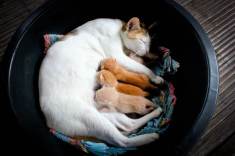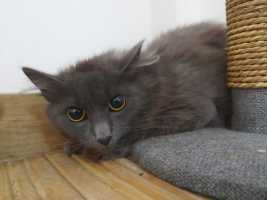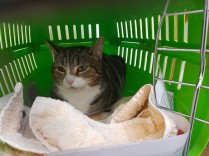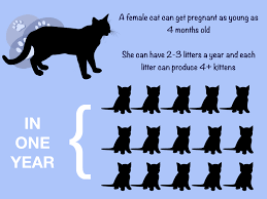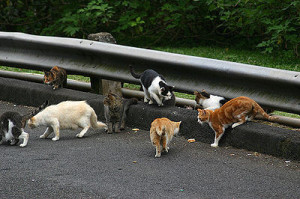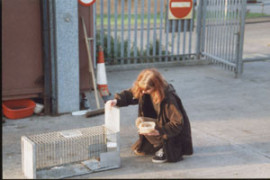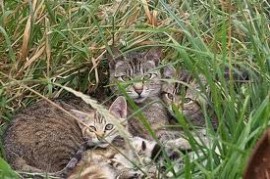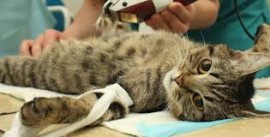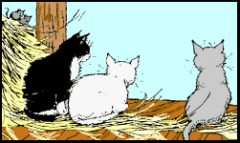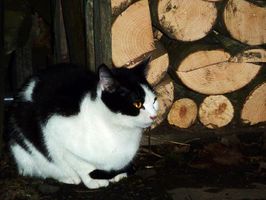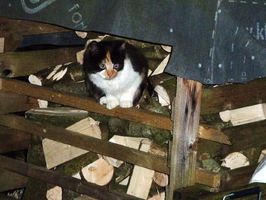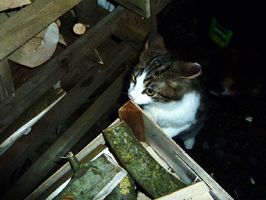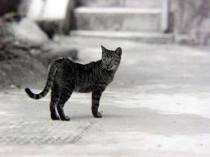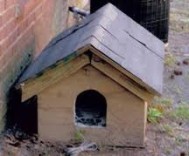Feral Cat Support
Concerned about a Stray Queen
If you have concerns about a stray, uncared for or feral cat that you have reason to believe is pregnant or has young kittens then please cotact us at Westgate Ark for a fast track admissioin process to get the mother and kittens to safety.
Kittens born outside seldom live long or happy lives, they die early from disease & malnutricion.
Scruffs
Pip the street now spayed & homed!
Pip is not quite a feral cat but is a very scared cat who has been living out-doors on the streets of South Benwell for a long time!
Saved from starvation by kind local residents who built her shelter, fed her and have homed her kittens in the past. Eventually taken off the streets in January 2023 by Westgate Ark, and has now been spayed and successfully homed!
Anyone wanting to contribute a small amount towards her spaying costs at the vets can do so by transferring as little as £2 into our paypal account and marking it 'Pip's spay operation'.
What is meant by Feral cats?
Feral cats are those cats which live wild, where a group of feral cats live together, this is referred to as a colony.
They shun human contact, though starvation will often force them into close proximity with us when scavenging for leftovers.
Ferals may have been born into the colony or they may have been stray or abandoned cats that have reverted back to a semi-feral state.
Starvation, ill-health, disease and over-population often provoking culling, are amongst the biggest problems faced by feral colonies.
There is a big difference between a lost cat which may be initially a little scared of being handled by a stranger and a true feral cat which will be irreversibly frightened to the core.
Can they be domesticated?
In order to domesticate a feral cat it is really necessary to be able to intervene whilst that cat is still a kitten. Once past the eight week stage it fast becomes increasingly difficult to reduce the kittens' fear of human contact.
You will always hear people bragging about having domesticated their family cat which they claim, was a feral when first found, but in most cases the cat was probably just lost a few days before and simply a little scared for the first day or two.
There is a world of difference between this and a truly feral cat.
Neutering Feral Cats
It is normally essential to use a special humane trap with which to catch feral cats safely, so that they can be taken to the vet to be neutered or otherwise treated.
During anesthesia it is good practise for the vet to ear-tip, for future identification purposes. This is done by surgically removing a six milimetre sliver from the left ear.
This is a lessor cruelty than the consequences of failing to indicate effectively which cats have and have not been trapped, assessed, treated and neutered.
What can be done to help feral cats?
The best thing to help feral cats is to put out dried food regularly, as opposed to tinned meat which will soon be covered in fly eggs and to provide a warm, dry hideaway for the cats out of the wind.
In the long term the stability of a feral colony may be dependent upon its size.
Should the colony grow too large then its existence will become increasingly threatened by people to whom the cats may constiute a nuisance.
You can do the best for the colony by having neutered all it members, which will will help contain its population growth.
Found Some Kittens?
If you have feral kittens growing up in your back garden you should try and get a rescue organisation to take them as soon as possible.
If you are near to us in Tyneside then please do contact us at Westgate Ark as we may be able to come out or suggest another reputable local cat rescue organisation or cat rescuer.
If they are less than five weeks of age, then the mother should be trapped and kept with them in a pen suitable for feral cats, for the next few weeks at least.
What then happens to the mother?
When seperated, the queen, if a feral, should be spayed, ear-tipped and returned to the place where she was caught.
To force close contact upon her, if unwelcome, can be cruel and dangerous. It is a necessary evil to return a feral cat to her point of capture, but now spayed and ear tipped then at least the
miserable cycle of more feral kittens born is broken.
This is what she is used to and there is normally no viable alternative. Sometimes it is possible to secure a place for a feral cat on a farm or stables but such suitable offers are few and far between.
We normally try and keep such places for relocating feral cats whose colony is under some form of threat.
Our Feral Help Programme involves:
- Spaying and neutering to control the size of colonies thus lessening the competition for food.
- Trapping and testing for the leukaemiaa (FeLV) and feline aids (FIV) viruses.
- The rescue, domestication and rehoming of feral kitttens less than 10 weeks old (after this feral behaviour patterns become ingrained).
- Treating injuries such as abscesses and damaged tails.
- Resettlement of colonies under threat, to more suitable locations such as farm land or stables, where possible.
Example homing of three semi-ferals
This feral cat rescue and homing involved three adolescent cats that were stuck in 'no-mans land'. Too old to be domesticated fully within a reasonable time, yet too young to be in with much of a chance of surviving the cold and brutal life of a feral cat.
This photo shows the oldest youngster nicknamed Charlie, cuddling up with two other slightly smaller feral youngsters also rescued. The three started a new life on a small holding near Hexham with owner Mark caring for them.
All three cats have now been neutered and are used to people to some extent. On the small holding they have plenty of dry sheltered spots with someone feeding and caring for them, but also the freedom and space to be independent.


